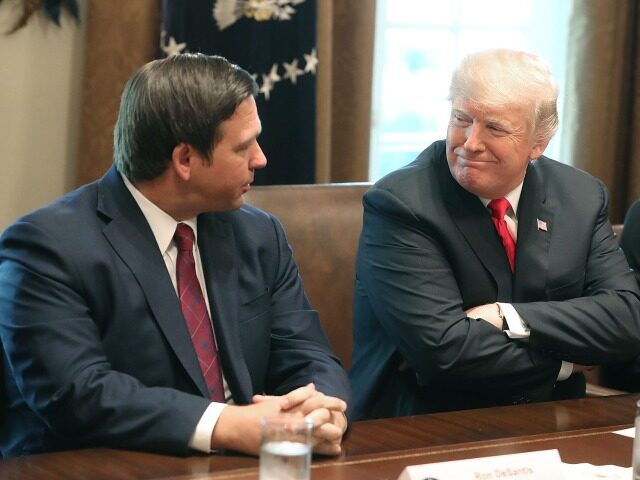Former President Donald Trump continues to dominate the Republican primary field, more than doubling his closest competitor’s support, according to a YouGov/Economist poll. The poll also found President Joe Biden and Trump are neck and neck in a hypothetical general election race.
Trump sits atop the field with 48 percent of support among registered voters who plan to vote in the GOP primary, placing him 26 points ahead of Gov. Ron DeSantis (R-FL) with 22 percent. A YouGov poll conducted for Yahoo News last month showed similar results among a sample of U.S. adults. Trump landed at 48 percent in that poll, while DeSantis was at 24 percent.
No other candidate in the current poll breaks double digits, with former Vice President Mike Pence at five percent in third place.
Sen. Tim Scott (R-SC) and former Gov. Nikki Haley (R-SC) follow right behind Pence, with three percent apiece, while entrepreneur Vivek Ramaswamy and former Gov. Chris Christie (R-NJ) tie at two percent.
Former Gov. Asa Hutchinson (R-AR), Gov. Doug Bergum (R-ND), Miami Mayor Francis Suarez, former Rep. Will Hurd (R-TX), and conservative radio host Larry Elder did not secure a percentage point.
The poll also asked Republicans who their second choice candidate would be, revealing 34 percent have DeSantis as a backup plan, while 13 percent say Trump is their second choice. Ten percent say Ramaswamy is their second favorite candidate, while nine percent see Scott and eight percent see Pence in that light. Another five percent say Haley, while two percent identify Christie as their second option. Elder and Hutchinson each took one percent.
The first choice portion of the poll included samples from 502 registered voters planning to vote in the primary, while 435 respondents who had a preferred candidate were included in the second choice aspect.
Regarding a hypothetical general election race between Trump and Biden, YouGov found that 40 percent of the 1,500 U.S. adults in the full sample want Trump as the next president, while 39 percent support Biden. When the sample is reduced to just the 1,296 registered voter respondents, the foes tie at 42 percent of support, with 7 percent backing someone else. Another three percent are undecided, and six percent would not cast a ballot.
Trump holds an advantage among independents, leading Biden 33 percent to 27 percent. Biden leads by 20-points with those between the ages of 18-29, while he holds a slim 3-point lead among the 30-44 demographic. Trump enjoys a nine-point advantage in the 45-64 population and an 11-point margin between Biden and himself among those older than that.
While the race is neck and neck, a plurality of adults and registered voters expect Trump to again win the presidency. Of adults, 40 percent think he will win compared to 38 percent who think Biden will. Among registered voters, 41 percent believe Trump will be victorious versus 40 percent who say Biden will win a second term.
The poll also asked respondents for their opinions on Trump and Biden’s leadership abilities, finding that they overwhelmingly perceive Trump as a stronger leader.
Regarding Trump, a majority of 54 percent of registered voters tab him as a “strong” leader to varying degrees, with a plurality of 33 percent saying he is “very strong.” Another 45 percent say he is a “weak” leader to different levels.
Conversely, 37 percent of voters think Biden is a “strong” leader, including just 14 percent who say he is “very strong,” while 65 percent see him as “weak.”A plurality of 44 percent of voters perceive him as “very weak,” while 19 percent say he is “somewhat weak.”
The poll sampled 1,500 U.S. adults, including 1,296 registered voters, between July 8-11. The margin of error (MOE) adjusted for weighting is plus or minus 2.9 percent, while the MOE among registered voters is plus or minus 2.8 percent.

COMMENTS
Please let us know if you're having issues with commenting.